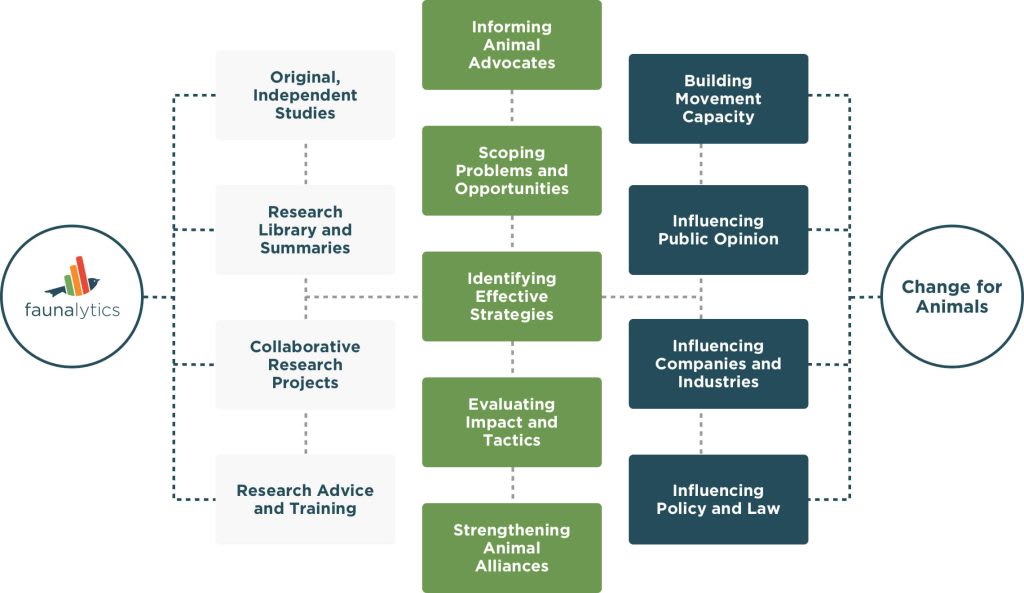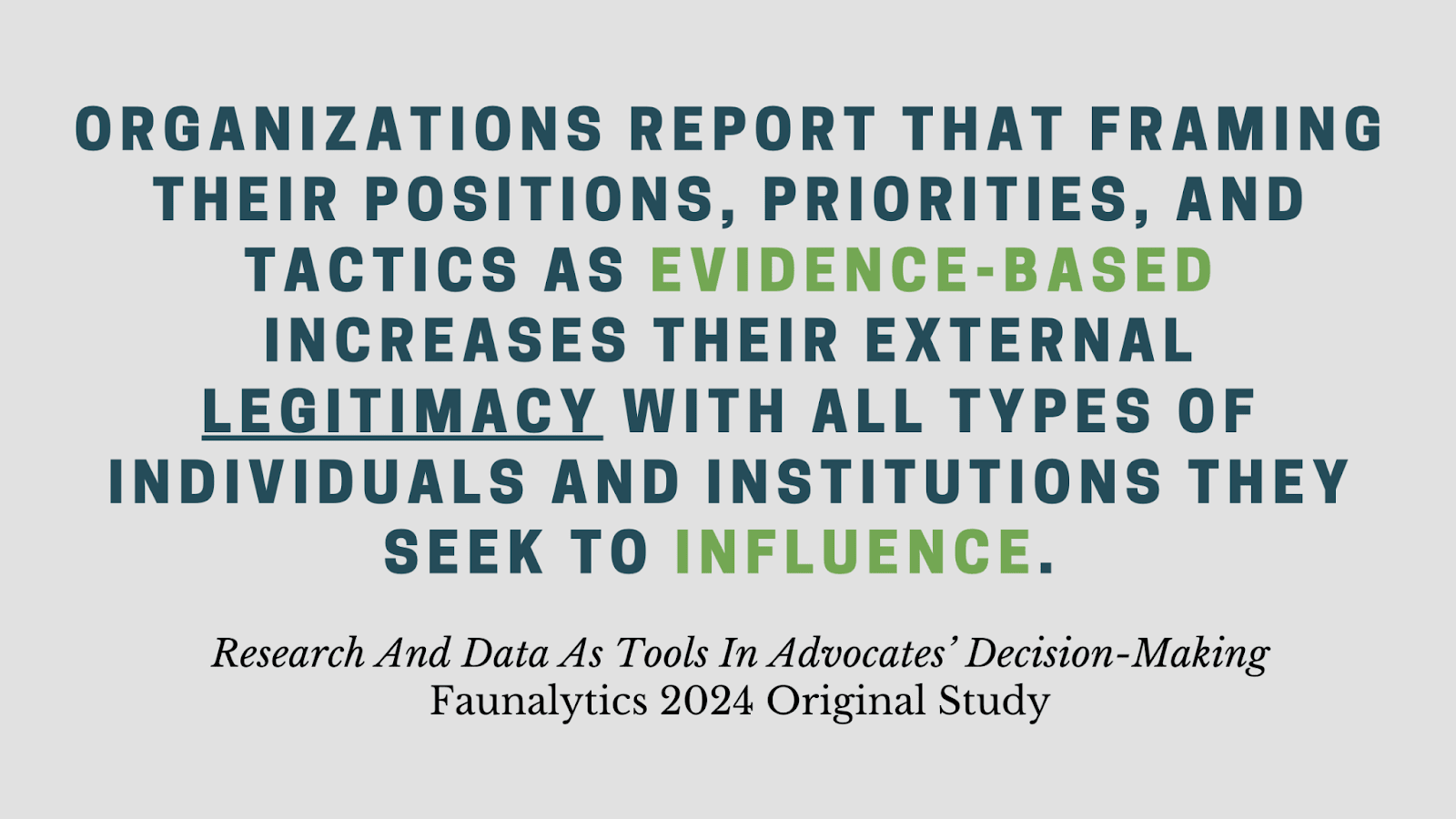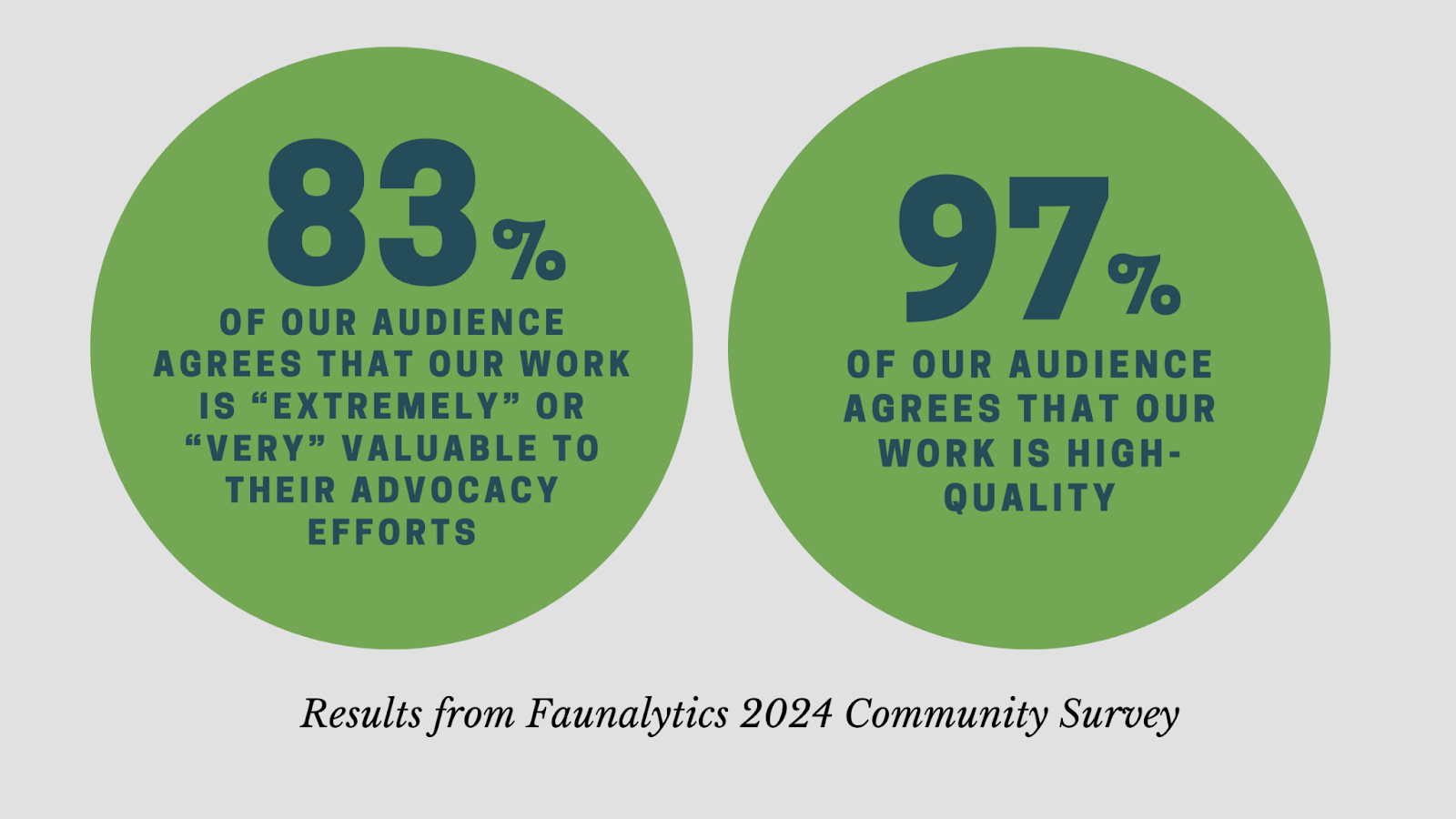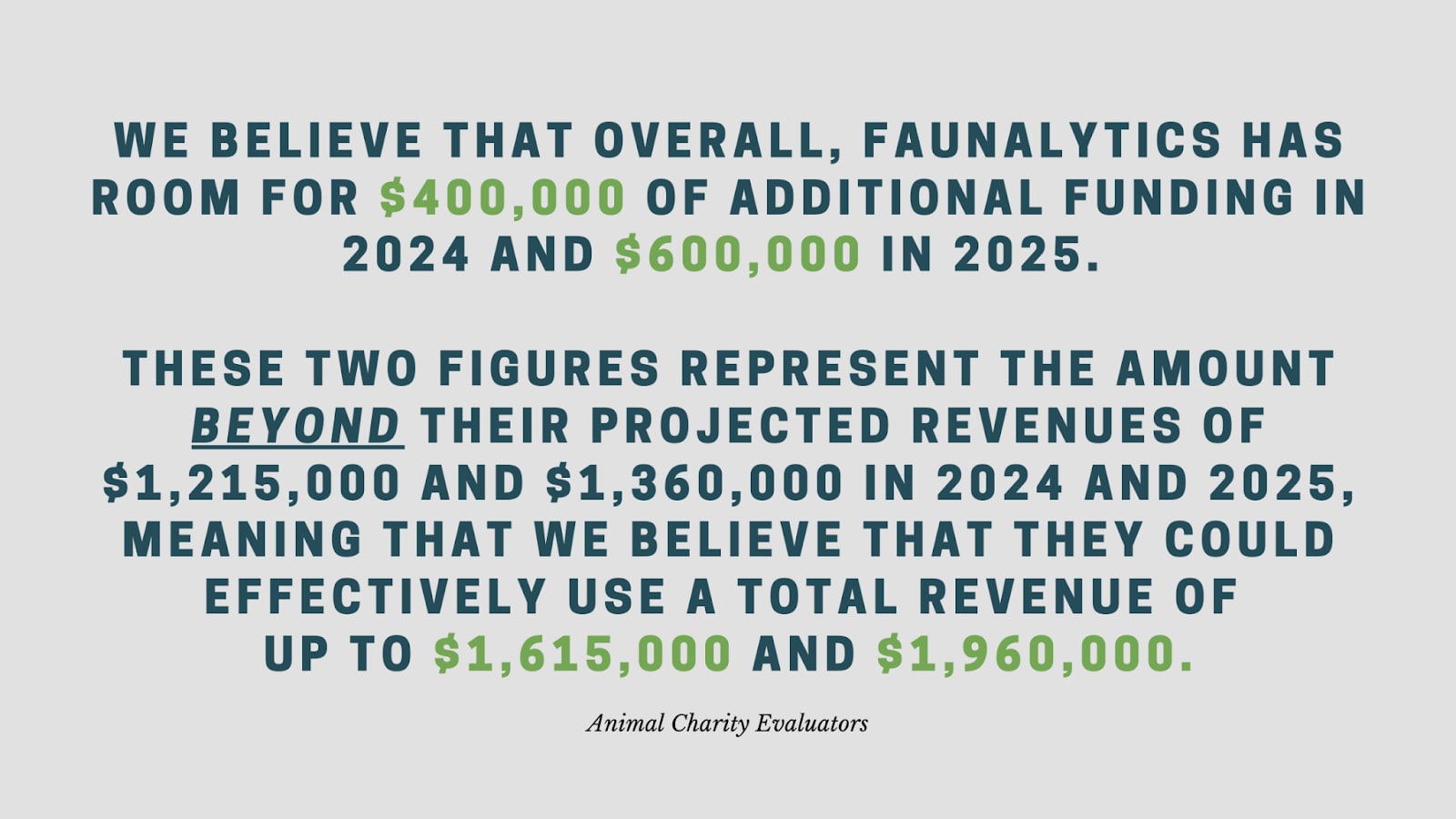TL;DR:
- Marginal funding will be directed to filling Faunalytics’ 2024 funding gap of $385,000.
- This gap consists of residual funding needed for 10 original research studies.
- Donate on the Faunalytics website here.
About Faunalytics
For nearly 25 years, Faunalytics’ mission has been to empower animal advocates with access to research, analysis, strategies, and messages to maximize their effectiveness in reducing animal suffering. We have been named a Recommended Charity by Animal Charity Evaluators since 2015.
We enable evidence-based advocacy through three main program areas:
- Original Research: Faunalytics conducts roughly eight original research studies each year that are likely to have a high impact on animals. We identify our research projects through a 4-stage prioritization process, which includes gathering input from advocates and topic experts to find knowledge gaps and conducting assessments to verify potential for impact.
- Research Library: We host the world’s largest open-access collection of animal advocacy research. By curating 6,000+ research summaries, blogs, report translations for impactful regions, and visualizations such as infographics and videos, we ensure that advocates can access the research needed to make their efforts more effective.
- Research Support: Beyond providing research, we ensure advocates have the support they need to apply research to their work. We’ve directly advised over 2,000 advocates through our Office Hours and Research Ambassador project. We also host an annual online research symposium, Fauna Connections, to connect advocates with the latest research from the academic community.
We continuously assess our progress to impact through our annual Community Survey, program and project specific surveys, and assessments from third parties such as Animal Charity Evaluators, Guidestar, and Charity Navigator. These evaluations have been essential in informing our path and enabling us to grow and evolve with the movement to provide the research and capacity support needed for advocates to be as effective as possible in ending animal suffering.
Additional ways Faunalytics helps to guide and amplify the efforts of our movement include key initiatives including (but not limited to):
- Our Research Scientist, Dr. Andrea Polanco, co-leads the RECAP (Research to End the Consumption of Animal Products) working group, where researchers provide regular updates to inform each other about their work, fostering increased collaboration to drive impactful change.
- Our Research Liaison, Björn Ólafsson, heads the Hive #Research channel, a dedicated platform where advocates and researchers can share ideas, ask questions, and explore new research initiatives. This channel not only facilitates ongoing conversation but also serves as a hub for resource sharing and community support. This ensures organizations can access expert guidance on leveraging research to enhance their strategic impact.
- Lastly, through our Research Ambassador outreach project, we provide customized, free presentations tailored for animal advocacy organizations. These presentations are designed to help groups understand and apply research insights effectively, empowering them to better achieve their missions.
Why Research?
Faunalytics' work is important because research and data empower animal protection organizations to make effective decisions and spend their limited resources wisely. Historically, there has been little capacity for research within the advocacy movement, and it is still a neglected issue due to the limited funding for farmed animals. Faunalytics addresses this gap by conducting and curating shared research resources and providing support to build capacity within organizations.
Bonus: You can see the five uses of animal advocacy research from Faunalytics’ 2024 study, Research And Data As Tools In Advocates’ Decision-Making here.
Original Research Plans
Faunalytics operates on a cost-effective budget of $1,150,000. Our upcoming original research collection of 12 studies currently has a funding gap of $385,000 USD.
We have 12 upcoming original research projects that will be impactful for farmed animals: four of which have not yet received funding, six are only partially funded, and two have been fully funded. Studies still requiring funding cover key areas such as corporate advocacy, policy and political advocacy, and promoting alternative products, and focus on the United States, Brazil, and China (countries with an immense scale of animal suffering and high tractability for impact as ranked by the Farmed Animal Opportunity Index).
Limiting factors to completing our high-impact current original research collection include narrow giving priorities of traditional donors and limitations around international giving. We are seeking $385K to go toward the completion of our planned research. Here is an example of how some of the funds will be put to use:
| Project | Description | Gap |
| Effective Communication With Political Staffers | There is limited research on what kinds of animal advocacy outreach are most effective when engaging in lobbying and grassroots outreach to politicians. In this qualitative study, we will interview U.S. political staffers instead of elected officials because political staff are more accessible to advocates while also acting as influential advisors to lawmakers themselves. We will obtain recommendations and lessons from political staffers, so that animal advocates considering legislative campaigning in the U.S. can better understand how to best approach lawmakers. | $6,715 |
| Voter Response to A Pro-Animal, Anti-Subsidy Candidate | Elected officials have the power to institute policies that can benefit huge numbers of animals. However, many politicians may be hesitant to talk about issues that affect animals for fear of electoral blowback. Among the most pressing political problems for animal advocates is the use of government subsidies to support the animal agriculture industry. In collaboration with Dr. Sparsha Saha, we will use an experimental design to test how political candidates can discuss pro-animal stances, like cutting or reallocating animal agriculture subsidies, in ways that appeal to voters in the U.S. and Brazil. The results will provide candidates and their campaigns with invaluable information aimed at helping them feel more able to put animals on the political agenda. | $18,129 |
| Messaging About Plant-Based Products in SE Asia | Southeast Asia’s diverse food cultures and beliefs create a unique challenge for promoting plant-based diets and alternative proteins. Recognizing the gap in region-specific research, this study embarks on comprehensive research to understand current perceptions and terminology around plant-based diets in Southeast Asia. The findings will provide actionable insights for animal advocacy organizations, helping them to improve campaign design and effectiveness in Southeast Asia. | $20,130 |
| Scoping Collaboration Across Social Movement Lines In Southeast Asia | This study investigates the potential for strategic collaboration between the farmed animal advocacy movement and other social movements in Southeast Asia. Recognizing the region’s rapid development in various nonprofit sectors, the research aims to map out and explore intersections where animal advocacy can align and synergize with other causes. This research will lay the foundation for exploring intersectional collaboration to increase the effectiveness of animal advocacy in Southeast Asia, potentially revealing new avenues for campaigns and fundraising. | $34,705 |
| Job Creation Due to Increased Focus on Plant-Based Foods | The state of the economy is consistently one of the most important issues U.S. voters consider when casting their ballots. Relatedly, lawmakers often consider the potential for job creation or job loss when determining whether to support specific policies. As a result, it is critical for animal advocates to understand the impact that a growing plant-based food sector will have on employment. This study will allow advocates to communicate with lawmakers and the public more broadly about the potential economic effects of transitioning to a more humane agricultural system. | $33,840 |
| Research And Data As Tools In Advocates’ Decision-Making in China | In our 2024 study about the impact of research in the animal advocacy movement, we identified the nuances of how animal advocacy organizations access, interpret, and use research, data, and other forms of evidence in their work. In this study (Phase II of the project), we build on these insights from Phase I by expanding our focus to the Global South, given the lack of knowledge on evidence-based decision making for advocacy groups in the region. Spearheaded by Good Growth Co., Phase II of this qualitative study will entail interviews with advocacy groups in Southeast Asia and China, given the latter's vastly different advocacy context and substantial impact on farmed animals. With this study, we hope to make research and data more available to animal advocates and stakeholders across China and elsewhere, and provide insight about how knowledge gaps, use, and transfer might be different in Northern and Southern contexts. | $38,269 |
| Case Study of Food System Education and Students' Subsequent Impact | Many animal advocates use classroom education as a way to teach children and young adults about the food system and compassion for animals, but measuring its long-term impacts is challenging and therefore neglected. In this case study, we seek to improve understanding of the long-term effects of school-based educational programs. We will examine the pathways taken by alumni of such a program, focusing on their educational and professional accomplishments and their retention in the animal advocacy space. This information will shed light on the effectiveness and value of educational programs for the animal protection movement. | $28,373 |
| Green And Humane: Engaging Generation Z | ‘Generation Z’, aged roughly 18-26, are decidedly more aware of the pressing issues that threaten the world as compared to their predecessors, making them a critical group to engage in animal and environmental protection. This study aims to identify strategies for harnessing the action and focus of Gen Z in the U.S., China, and Southeast Asia, by investigating their barriers and motivators in making pro-environment and pro-animal protection lifestyle changes and potential solutions to enable these changes. Further, this study will delve into Gen Z’s perceptions of ‘environmental protection’ and ‘animal protection’ as career paths, identifying what may act as potential barriers, motivators and facilitators to pursuing work in these fields, with the aim to help organizations understand, engage and develop future talents for our movement. | $11,631 |
| Balancing Inclusivity With An Animal-Oriented Mission | The U.S. farmed animal protection movement has long dealt with a lack of representation of Black, Indigenous, or People of Color (BIPOC). In this qualitative study, Faunalytics will partner with Dr. Ahmmad Brown to interview BIPOC animal advocates and non-advocates to understand their perspectives on inclusivity in the animal protection movement. We will present the inclusivity solutions that BIPOC participants proposed to non-BIPOC leadership in the movement and ask them about what it would take to implement these strategies within their organization. With factory farming now being recognized as one of the most pressing problems in the world, we must identify ways BIPOC individuals can feel included in our movement, bringing together people from all backgrounds to end factory farming. | $24,475 |
| Chicken & Fish Substitution Meta Analysis | Substitution of one animal product for another is always an undesirable outcome for reduction campaigns, but poses a particular problem when a smaller-bodied animal is substituted for a larger one, because of the larger impact in animal lives. For this research, being conducted in collaboration with Dr. Maya Mathur and Rethink Priorities, we will conduct a meta-analysis (an analysis of previously published data) to examine whether there is evidence of a substitution effect across many intervention studies. More specifically–although we will look for substitution across all products–we are most interested in whether the consumption of fish and chicken products increases when the consumption of cow and pig products decrease. If there is evidence of substitution effects, we will also use the available evidence to suggest characteristics of interventions that caused it, and suggest how advocates may be able to avoid them in their campaigns. | $11,670 |
| Remaining 2024 Funding Gap | Personnel expenses, Marketing/Promotion, Operations (i.e., legal and professional services, software expenses, taxes, filings, etc.), conference attendance, etc. A full copy of Faunalytics' budget can be found here. | $157,063 |
A note about cost: Faunalytics’ work informs hundreds of thousands of viewers each year, but our impact can’t be condensed into quantitative outputs alone. Our aim isn’t just to increase the number of original research studies or data sets available to the movement, but to focus on maximizing the impact of each project. Determining the impact of Faunalytics’ work per dollar invested is complex since research and capacity-building are indirect aspects of advocacy. Research is more than study design, data analysis, and reporting; it also includes the time we spend following up with advocates and organizations to ensure they understand the findings and use them effectively. As such, we’re proud to share the following highlights and testimonials:
We believe our strength lies in those who turn our research into action, as demonstrated by just a few of the organizations below:
- “The data provided by Faunalytics on the days of suffering involved in producing various types of animal products were crucial in helping Anima International France estimate the cost-effectiveness of its institutional meat reduction campaign. Without Faunalytics' work, our analysis would likely have been significantly flawed. Having precise data enabled us to be more accurate in assessing the impact of our intervention on animals, ultimately leading us to completely reconsider our approach to find a more effective way to reduce animal suffering.” - Keyvan Mostafavi, Anima International
- “I have found Faunalytics to be an invaluable source of information on human-animal interactions, attitudes towards other species, and the animal protection movement. I regularly use their website to keep up with current research findings - their reports on specific issues are comprehensive and refreshingly objective.” - Hal Herzog, Ph.D., Professor of Psychology, Western Carolina University
- “Research is fundamental to helping farmed animals, as making informed and data-driven decisions when campaigning is imperative for achieving good results. For this reason, Sinergia Animal believes Faunalytics is an essential organization in the animal rights movement.” - Taís Toledo, Food Policy Lead, Sinergia Animal
- “We firmly believe that the best decisions for animals are based in data and informed by high-quality research. That’s why one of the first things Fish Welfare Initiative does when embarking on a new project is to check Faunalytics to see what research is available.” - Haven King-Nobles, Fish Welfare Initiative
Room for More Funding
Should Faunalytics raise beyond our $385,000 funding gap outlined above, we’d like to tackle the following:
| Potential Projects | Amount of Funds |
Global Farmed Animal Advocacy Databases
| $65,000 |
Secondary Data Analyses We’d like to dive into pre-existing datasets, including:
| $35,000 |
| Development Support Faunalytics is a small team of 13, and our fundraising team only includes the Executive Director and Philanthropy Manager. This summer, Faunalytics brought on two Philanthropy Interns, greatly increasing our ability to focus on diversifying our fundraising revenue. To help Faunalytics grow to the next level, we must bring on additional, permanent development support. | $55,000 |
Researchers & Analysts Hire a Senior Research Scientist, Research Scientist, M&E researcher, and bring our Data Analyst to full time. There are countless research questions that still need answering (for example, see Open Philanthropy’s list), and we need more researchers in order to address these knowledge gaps for advocates. | $245,000 |
How To Contribute
You can donate on the Faunalytics website here, through Paypal here, through the Giving What We Can Platform (for U.K. donations or cryptocurrency), or send a check addressed to Faunalytics at Post Office Box 152703, San Diego, CA 92195. We also accept DAF donations, stock gifts, legacy gifts, and employer matches. Please contact our Philanthropy Manager, Liz, with any questions about making a donation at liz@faunalytics.org. Thank you for your support!




